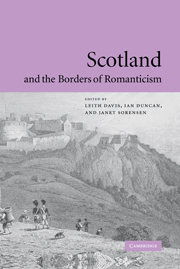Book contents
- Frontmatter
- Contents
- List of contributors
- Acknowledgments
- Introduction
- 1 Coleridge, Hume, and the chains of the Romantic imagination
- 2 The pathos of abstraction: Adam Smith, Ossian, and Samuel Johnson
- 3 Antiquarianism, the Scottish Science of Man, and the emergence of modern disciplinarity
- 4 Melancholy, memory, and the “narrative situation” of history in post-Enlightenment Scotland
- 5 Scott, the Scottish Enlightenment, and Romantic Orientalism
- 6 Walter Scott's Romantic postmodernity
- 7 Putting down the Rising
- 8 Joanna Baillie stages the nation
- 9 William Wordsworth and William Cobbett: Scotch travel and British reform
- 10 Burns's topographies
- 11 At “sang about”: Scottish song and the challenge to British culture
- 12 Romantic spinstrelsy: Anne Bannerman and the sexual politics of the ballad
- 13 “The fause nourice sang”: childhood, child murder, and the formalism of the Scottish ballad revival
- Index
11 - At “sang about”: Scottish song and the challenge to British culture
Published online by Cambridge University Press: 22 September 2009
- Frontmatter
- Contents
- List of contributors
- Acknowledgments
- Introduction
- 1 Coleridge, Hume, and the chains of the Romantic imagination
- 2 The pathos of abstraction: Adam Smith, Ossian, and Samuel Johnson
- 3 Antiquarianism, the Scottish Science of Man, and the emergence of modern disciplinarity
- 4 Melancholy, memory, and the “narrative situation” of history in post-Enlightenment Scotland
- 5 Scott, the Scottish Enlightenment, and Romantic Orientalism
- 6 Walter Scott's Romantic postmodernity
- 7 Putting down the Rising
- 8 Joanna Baillie stages the nation
- 9 William Wordsworth and William Cobbett: Scotch travel and British reform
- 10 Burns's topographies
- 11 At “sang about”: Scottish song and the challenge to British culture
- 12 Romantic spinstrelsy: Anne Bannerman and the sexual politics of the ballad
- 13 “The fause nourice sang”: childhood, child murder, and the formalism of the Scottish ballad revival
- Index
Summary
In Strange Country: Modernity and Nationhood in Irish Writing Since 1790, Seamus Deane comments on the process of translating Irish oral sources into print:
The sounds that issue from the mouths of the Irish – as speech, song, or wail – pose a challenge for those who wish to represent them in print … What is taken in by and emitted from the mouth cannot easily be represented in print. The movement from an oral to a print culture is not simply a matter of translating folk tales or customs from the mouths of the people to the page. It involves an attempt to control a strange bodily economy in which food, drink, speech and song are intimately related.
For Deane, translation operates as a violent form of control, a cutting off of the organic body in an attempt to assert ideological power. In this chapter I extend and modify Deane's analysis in examining the case of Scotland in the eighteenth century and the Romantic era, as I argue that the representation of Scottish songs in printed collections served not just to promote the cultural hegemony of a London-based Britain, but in many cases to challenge the basis of its power.
Collections of notated Scottish songs – for dancing, musical instruction, and amateur playing – began circulating throughout Britain before the eighteenth century, published variously in Edinburgh, London, and even Dublin and Paris.
- Type
- Chapter
- Information
- Scotland and the Borders of Romanticism , pp. 188 - 203Publisher: Cambridge University PressPrint publication year: 2004
- 7
- Cited by



